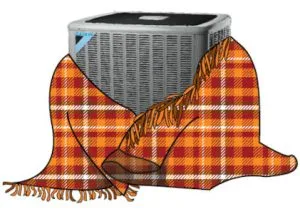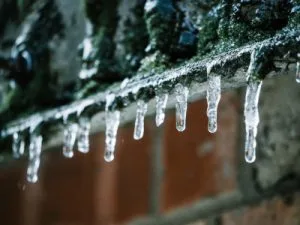Should You Cover Your AC Unit in the Winter?
Come fall, many people ask, “Should I cover my AC unit in the winter?”
An air conditioner is a sizable investment, and it’s natural to want to protect your investments. You just have to make sure that the way you protect it doesn’t actually do more harm than good.
To answer the question, there are benefits to covering your AC. However, it really depends on how you are covering it and the season you are covering it for. Whether you should cover your AC unit in just the fall or for winter as well is still a topic of debate.
Where you live and how severe the weather gets should also affect your decision.
In this post, we’ll go over the reasons you should or should not cover your AC and the factors that impact that decision.
Why You Should Cover Your AC Unit
There are some benefits in covering your AC unit for the winter. However, it’s likely not for the reason you think.
If you cover your AC, you’ll want to use a fabric, mounted cover, or awning just over the top of the unit. You want to keep the sides open so that the AC can breathe. If you’re not picky, you could also use something like a sheet of water treated wood. Just make sure it’s secured, so it doesn’t fly into your neighbors’ yard.

It’s Not for the Weather
You don’t need to cover your AC unit to protect it from the weather. Modern units easily withstand rain and snowfall. A resilient finish coats the parts inside the condenser (the AC box that sits outside your home). It needs to get airflow to allow the rain and snowfall to evaporate and keep the unit dry.
So, you don’t need to worry about the natural elements damaging your AC unit.
Covers Can Catch Debris and Windfall
Why you would consider covering your AC is actually to stop debris from falling into your AC unit. Your AC is not tree proof. Falling tree limbs can damage the condenser. Leaves and pine needles can get stuck in your AC unit and stop it from running efficiently. This becomes an issue come spring and can cause damage to the internal parts of the condenser.
A covering over the top could also redirect excess rain or catch heavy snowfall. The weight of heavy snowfall or excessive ice buildup could damage the parts of the AC. It’s not the AC getting wet that could damage it, it’s the shearing force of the weight.

Why You Shouldn’t Cover Your AC Unit in Winter
As we stated earlier, there are some downsides to covering your AC if you do it incorrectly.
ACs Are Designed to Withstand Rain and Snow
Your AC is designed to withstand the natural elements. If that is your only concern, then you may not need to cover your AC unit.
Trapping Moisture Can Damage Your AC
If you cover your AC, make sure you use a breathable fabric or just something to cover the top. You will have problems if you use a heavy plastic or cover the sides.
There is likely already some form of moisture inside your AC unit. Humidity or early rain fall can cause moisture to build up in your AC. If you use a cover that does not allow your AC to breathe, then your AC might develop mold, rust, or water damage. The AC condenser has a durable finish to protect it from water, but that water needs to dry to not be a long-term issue.

You Could Encourage Animals to Nest in Your AC
If you use a watertight cover, you might overly protect your AC.
The covering could encourage rodents or other pests to nest in your AC unit for the winter. They could wreak havoc with your AC’s internal parts. Not only that, but they could also be dangerous when you try to uncover your AC in the spring.
A Full Covering Can Break Your AC
If you do use a full covering and forget to remove it before spring or summer, you can potentially damage your AC. AC units need to pull air in to function properly. If your AC unit comes on while it is still covered, it won’t be able to get the airflow it needs. This can quickly damage a unit and cause a complete breakdown.
Pros and Cons of Covering Your AC
Pros
- Stops debris from falling into your AC.
- Keeps heavy snow or ice from weighing on your AC.
- Protects your AC from heavy falling objects.
Cons
- Can trap moisture and cause water damage.
- Can encourage wild animals to nest in your AC.
- Unnecessary if you just want to protect your AC from winter weather.
- A full covering can damage your unit.
How Location Affects Your AC Unit
Where you live will decide if covering your AC unit is worth it for you. Here is some guidance based on the environment that you live in.
Warm or Cold Climates
If you live in a climate with mild or even warm winters, like the South-West of the United States, then you probably don’t need to worry about ice or snow weighing on your AC.
However, if you live in a region with heavy snowfall or are expecting an ice storm, then you might put something over your AC to keep that weight off of the parts inside.

Heavily Wooded Areas
You might also consider covering your AC in fall if you live in an area with lots of trees. The natural debris they drop during fall can damage your AC if it gets stuck in there.
You could also cover your AC if you expect windstorms that could cause tree limbs to drop. Your AC is water resistant, not tree resistant.

What To Do with Window AC Units
If you have a window AC unit, you are not likely to use it during winter. You could pull it in and put it in storage to keep it out of the elements. If you cannot for any reason, then you could look into a cover for the exterior of the unit. Just remember to give it an exposed area to breathe from.
Who Are Advantage Heating and Air Conditioning?
We are your local HVAC Experts out of Salem, Oregon. We hope that this post gave you the information you need to keep your furnace running. If you have other questions about HVAC systems, check out our other blogs. To learn more about who we are and how we can help you, visit our website and follow us on social media – we’re here when you need us!







